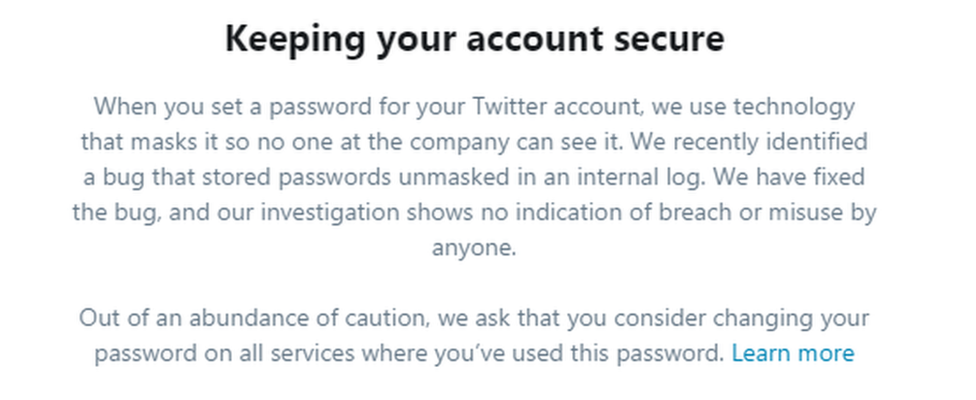Twitter users told to change passwords after internal leak

Twitter's 330 million clients are being asked to change their passwords after some were uncovered in plain content on its inward system.
A blunder in the way the passwords were taken care of implied some were put away in effectively coherent frame, said Twitter.
The passwords ought to have been put through a method called "hashing" making them exceptionally hard to peruse.
Security specialists said the way Twitter took care of the potential rupture was "empowering".
Significant presentation
The bug made the passwords be put away on an inner PC log before the hashing procedure was finished.
In a blog, the informal organization said once the misstep was revealed it completed an inner examination which found no sign passwords were stolen or abused by insiders.
Notwithstanding, despite everything it encouraged all clients to consider changing their passwords "out of a wealth of alert".
Twitter did not state what number of passwords were influenced but rather it is comprehended the number was "generous" and that they were uncovered for "a while".
Twitter found the bug half a month prior and has detailed it to a few controllers, an insider told Reuters.
CEO Jack Dorsey tweeted to state the "bug" had been settled.
Free security master Graham Cluley stated: "It's very promising that Twitter both found the issue inside, and educated its clients rapidly and straightforwardly.
"Something comparable simply happened to Github and I think about whether Twitter's revelation was caused by them asking: 'Hello, see that Github issue? Do you figure something to that effect could happen to us?'."

Security master Per Thorsheim, who routinely prompts firms about the best watchword rehearses, said Twitter ought to be "hailed for its straightforwardness".
"The issue they found is known since the beginning of logins with passwords," he told the BBC. "The possibility of passwords (or fizzled passwords) getting logged, in plain content logs accessible for staff or in most pessimistic scenario, finish outsiders, is notable."
Troy Hunt, who runs the Have I Been Pwned site, which logs ruptures, said the blunder was not something that would stress him in light of the fact that there was no sign that the login passwords were seen outside the organization.
Mr Hunt included: "We've unquestionably observed numerous points of reference of essentially defects bringing about information ruptures.
"The Red Cross Blood Service in Australia utilized an outsourcing supplier who coincidentally distributed their whole database to an open web server bringing about Australia's biggest ever information rupture," he said.
Every one of the three specialists encouraged clients to follow up on Twitter's recommendation and change their secret key.
Mr Cluley said empowering two-factor validation that adds another ID check to login endeavors would help "solidify" accounts.